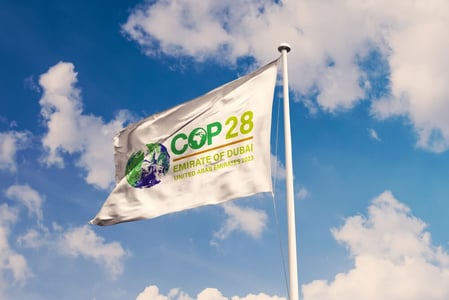In a historic move, the agreement negotiated at COP 28, after tense negotiations, marks a significant turning point in the fight against climate change. For the first time, an international text explicitly calls for a reduction in the use of fossil fuels, symbolizing notable progress and a significant advance. However, the devil is in the details: the challenge was to reach a consensus among all participating states. The United Arab Emirates, in particular, played a key role, demonstrating its influence on the international stage by adhering to this notion of "transitioning away from fossil fuels."
NGOs and countries of the South, especially island states, would have preferred a firmer commitment towards a complete phase-out of fossil fuels. The current wording leaves room for interpretation and does not specify whether the reduction in fossil fuels should be relative or absolute.
At the heart of this climate battle lies a crucial distinction: it's not just about reducing the relative share of fossil fuels in favor of low-carbon energies but completely eliminating them. Indeed, a state can reduce the proportion of fossil fuels in its energy mix simply by increasing the use of renewables faster while continuing to increase its absolute consumption of fossil fuels, which would not solve the climate problem and could even worsen it.
It is also important to note that natural gas, despite its name, is a fossil fuel. This agreement considers it a "transition energy," part of a "just, orderly, and equitable" transition.
Beyond these semantic debates, the agreement addresses other crucial points, such as tripling renewable energy production capacities by 2030 and improving energy efficiency. It also highlights the development of nuclear energy, which, despite its drawbacks, has the significant advantage of being low-carbon.
Another notable aspect of this agreement is validating the fund for loss and damage, an idea mentioned at COP 27 in Sharm el-Sheikh. This fund, supported by the countries of the North, aims to cover the negative impacts suffered by the countries of the South. Although contributions are voluntary and potentially insufficient, they represent a step forward.
On the sidelines of the main agreement, several major powers, including the European Union, the United States, Indonesia, and Vietnam, committed to accelerating the phase-out of coal, a major source of climate pollution.
A striking fact of COP 28 is the increased presence of fossil fuel lobbyists, with 2,456 accredited representatives, four times more than the previous year. This presence is comparable to that of large national delegations and exceeds that of the countries most vulnerable to climate change.
It has been reported that the COP president, Mr. Sultan Al-Jaber, has made remarks questioning the scientific basis linking the transition away from fossil fuels to the goal of limiting global warming to 1.5°C. These comments appear to disregard the detailed findings of the IPCC reports, which provide an alternative and more alarming scientific perspective.
However, he clarified that his comments were about the challenges of transitioning away from fossil fuels while ensuring sustainable development. His stance, while acknowledging the complexities, does not directly oppose the IPCC reports' findings on the necessity of reducing fossil fuel use to mitigate climate change.
In conclusion, COP 28 stands as a landmark event in the global effort against climate change, balancing the urgency of action with the complexities of international consensus. While it pioneers in explicitly calling for fossil fuel reduction, the agreement also acknowledges the challenges of a full transition, especially from coal, particularly in the context of sustainable development. This nuanced approach, coupled with commitments to strengthen renewable energies and the loss and damage fund, reflects a pragmatic yet hopeful stride towards a more sustainable future. The presence of varied interests, including fossil fuel lobbyists, underscores the ongoing dialogue and debate that will shape our collective response to the climate crisis.

